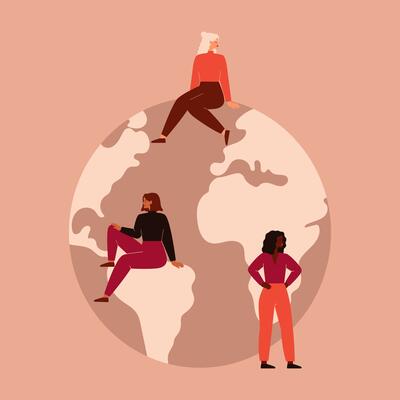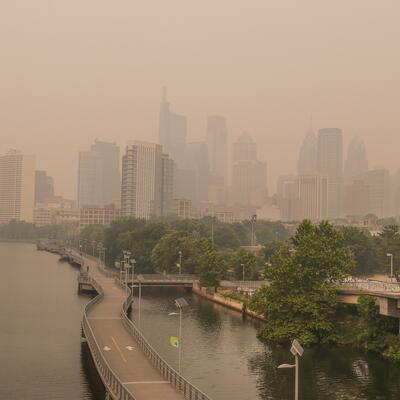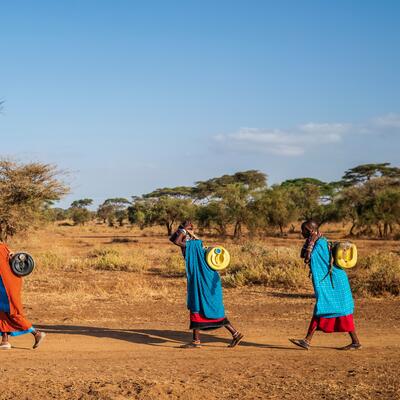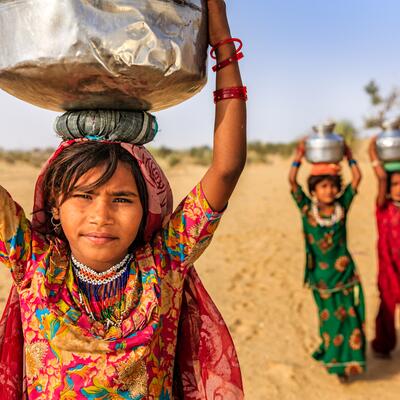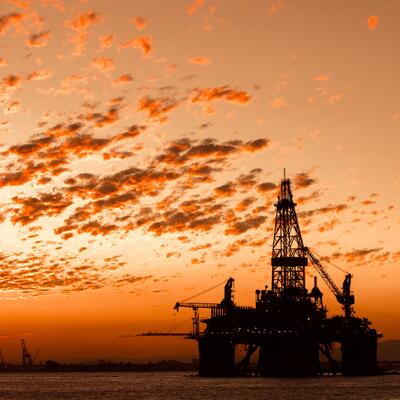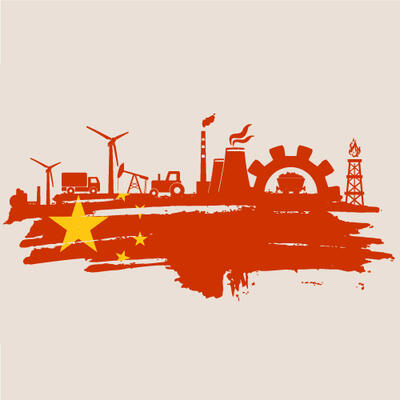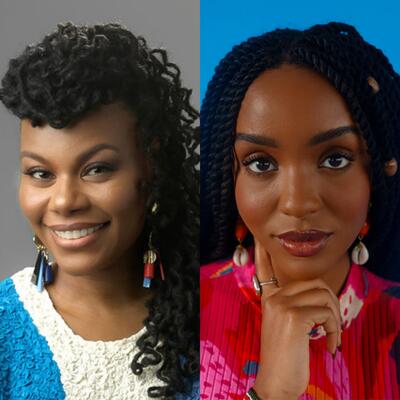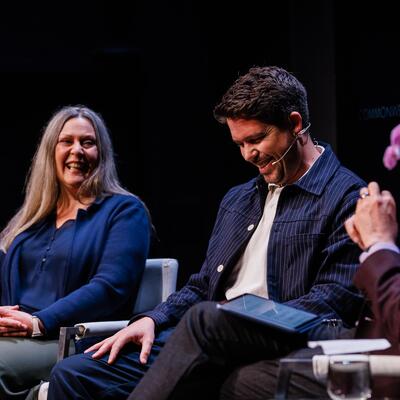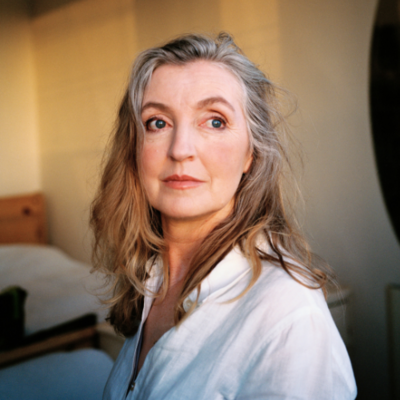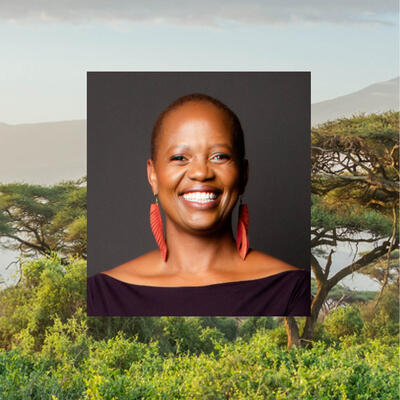
Wanjira Mathai on Sustainable Development and the Power of Women
Guests
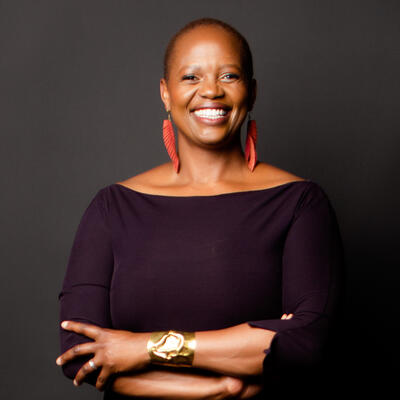
Wanjira Mathai
Summary
Africa is responsible for less than 4% of global greenhouse gas emissions. Yet its people are already suffering some of the world’s most devastating climate impacts. Wanjira Mathai, Regional Director for Africa and Vice President at the World Resources Institute, points out: “We are fighting a battle that was never ours to fight with tools we do not have and finance we do not have. That is a moral question and it is still a moral question on climate.”
As the Global North looks to reduce its addiction to fossil fuels, the minerals required to do so increasingly depend on exploiting natural resources in the Global South, exacerbating a cycle of extraction, environmental devastation, dislocation, and political and social instability. Mathai says, “We have to admit the relationship between the North and the South, with respect to natural resources, has been one of exploitation. I don't think we can say that a lot of those minerals or the beef industry in the US that is driving the deforestation of the Amazon or there the green technology industry that is driving mining in the Congo or even the palm oil plantations that are driving the cosmetic industry in Europe. These are not relationships that have been built on mutual respect and solidarity.”
Shortened supply chains and localized trading could be one path to relieve exploitative trade practices. Mathai says, “I support building shortening supply chains, absolutely building prosperity more regionally. I think we should grow what we eat and eat what we grow absolutely. We need to do better with regional trade. That’s how we’ll build prosperity. We need to do better with value addition, that’s how we’ll build prosperity. There’s a reason the president of Ghana continues to talk about the fact that he will start producing chocolate in Ghana. The sooner the better so that they can build prosperity with the resources that they have. The same should be across the world and that will be the only way that we can build the sort of prosperity we want to see.”
Mathai advocates for a transition from an intellectual conversation about the climate crisis to a more emotional and connected one: “And that's why youth are so important in this movement. They actually can’t understand why we have absolutely inertia, nothing but inertia in the face of such devastating prognosis about what's going to happen in the next seven years… Why are we not moving with more urgency? That's the intellectual overcoming the emotional. Because apparently if we were more connected to the reality of that, we would not be joking about it and we would be moving with more haste.”
Wanjira Mathai is also the daughter of Nobel Peace Prize Laureate Wangari Maathai, who empowered more than 4,000 women’s groups to protect and restore their local forests, even in the face of death threats. She remembers the impact her mother made on her life:
“It was only later that I started working with her and I would look over her shoulder and I really started to appreciate just how genius the work of the Green Belt Movement was. And just how genius and connected and thoughtful she had been in creating this incredible women's movement and tapping into the brilliance of those women their knowledge to be sensitive…I always felt that to have had the front row seat in this amazing, amazing theater of her life was a privilege of very high on us. So, I always felt like I was basking in her light. And I still do today. Everything good that happens to me I always attribute, sometimes to the inspiration that she was in my life. So, that's nothing to me but light.”
Related Links:
Six Seconds Emotional Intelligence Network
Full Transcript
Greg Dalton: This is Climate One. I’m Greg Dalton. Africa is responsible for a tiny portion of global greenhouse gas emissions. Yet its people are already suffering some of the world’s most devastating climate impacts. And as the Global North looks to reduce its addiction to fossil fuels, the minerals required to do so increasingly depend on exploiting natural resources in the Global South, exacerbating a cycle of extraction, environmental devastation, dislocation, and political and social instability.
Wanjira Mathai is Regional Director for Africa and Vice President at the World Resources Institute, and the daughter of Nobel Peace Prize Laureate Wangari Maathai, who empowered more than 4,000 women’s groups to protect and restore their local forests, even in the face of death threats. Wanjira herself has tackled global issues such as landscape restoration, youth leadership and sustainable development. In doing so, she has focused on the power of emotional intelligence and has repeatedly been named one of the 100 Most Influential African Women.
I asked about her reaction to the fact that, despite G20 countries being responsible for about 80% of emissions, people in poor countries are suffering climate impacts first and worst.
Wanjira Mathai: It makes me sad. It makes me mad because it is a great injustice that. Just as you put it, it really is the most important question that we must address is that injustice.
Greg Dalton: And how do we do that and what role can empowering women play in doing that?
Wanjira Mathai: You know, Greg, one of the things that is truly important is to acknowledge that injustice. The first thing is knowing that exactly science is so clear now that the climate is changing; it’s changing because of what we are doing to it. The human impact on climate is now indisputable. And then the fact that actually with that climate change will become absolutely unbearable impact. And those impacts will hit hardest those who have done the least to cause this problem. Now, that in itself if you look at a continent like Africa where I live in Kenya. What that means for daily life is the disruption of farming, the disruption of movement of goods and services, especially when we have too much water or too little water which is heavy rains or no rains at all. We are largely a rain-fed agricultural economy. The GDP of many parts of our world are driven by agriculture, rain-fed agriculture. So, just imagine for a second the impact of not having rains at the right time at the right place. It really does wreak havoc on food security. And that is fundamentally what we absolutely need to survive. We haven’t even talked about the damage to livelihoods, businesses that are flooded out, businesses that rely on energy that is coming from hydroelectric power when water levels are low you cannot run this. The entire livelihood and systems that we depend on our entire life support systems are built on a healthy climate and a healthy environment and that’s at stake. And women are at the heart of this transformation. Women drive agriculture on the continent. Women hold their communities together, their children together. We know from research actually, Greg, that women spend close to 70% of their income on their families.
Greg Dalton: And impacts are disproportionately landing on women who often fetch water often cook over dirty cookstoves. So, how are the impacts disproportionally affecting women and what impacts are you already seeing personally?
Wanjira Mathai: Well, we have those impacts that are affecting society as a whole impact like infrastructure destroyed. And so, we cannot have movement of goods and services which is about trade, which is of course about the livelihoods of people being able to run their businesses. We have issues of lack of water which spells havoc in a drought situation, droughts becoming famines and people going hungry. We have millions of people in the East African region at the moment hungry because rains have failed for 3, 4 years in a row. And so, we have absolute disasters and that is women and children most disproportionately affected. We do have an energy crisis. And one of the things that is becoming abundantly clear now is that energy development and climate are inextricably linked. We cannot talk about climate change adaptation. The ability to bounce back from the worst of climate if we do not deal with the ability for communities to lift themselves from poverty. Because, Greg, poverty is the greatest underlying driver of vulnerability. And that vulnerability is what causes so much loss and damage when we have the impacts of climate change. And so, being able to build a level of prosperity is very much a part of building resilience. And you cannot build resilience and you cannot build prosperity if you do not have energy. So, energy becomes a really important part of the climate discussion.
Greg Dalton: Right. In that transition we know that developing countries if they develop in the fossil intensive way that the industrialized North developed that explodes carbon emissions. So, how can that prosperity you're talking about happen in a new cleaner way is it with leapfrogging technology it’s not by following the playbook of Europe and North America.
Wanjira Mathai: Well, Greg, that’s true. But here’s the reality that Africa has is responsible as you said in the beginning of the program for 4% of global emissions. Remember that 3% of those are in South Africa. So, overall Africa outside of Africa is responsible for just 1% of global emissions. We also have 600 million people who are cooking on open fires around the world. We have a majority of those here on the continent. We have poverty levels that are unacceptable but 750 billion people living under the poverty line: absolutely unacceptable. We have got to make addressing the energy situation also about addressing poverty. And addressing poverty therefore means we have to make available the resources for that clean energy transition because we know unfortunately, Greg, there has been very little solidarity with the vulnerable countries on the renewable energy agenda. Yes, we know that that's the best way to go. Yes, we know that that would be even cheaper but it takes a significant amount of resources to build the technology and put it in place to deliver renewable energy and sustainable energy for all. The challenge we have today is that of all renewable energy investments globally only 2% in Africa. What are we saying about what Africa needs, what Africa's development needs are? What African’s economic development needs with respect to energy when we only allow 2% of investments in renewable energy. Africa’s agenda cannot wait and that's why there is a discussion around what alternatives does Africa have. Because the skin in the game that most of us have is that we are faced with poverty levels that are unacceptable, but we also see very little solidarity from the North. We see very little solidarity on climate finance. We know that we've been talking about 100 billion for a long time two decades and we haven't seen it come. And so, how our governments and our leaders supposed to address the energy poverty situation. Renewable energy, yes, but who's gonna pay and when?
Greg Dalton: Right. And that comes down to we’re in an age, particularly in the United States, where taxpayers don't like to invest even in their own infrastructure and their own roads and airports, things that you think would serve the country. So, what’s the case to be made for why Americans or Europeans should send their tax dollars to a continent that they know little about where they will probably never travel and it seems so far away to them. How do you make that case, other than kind of the moral obligation what’s in it for them? Because sadly that case has to be made.
Wanjira Mathai: Absolutely, Greg, that case has to be made. But no better case was made than with the COVID pandemic. We knew that the COVID pandemic left unaddressed everywhere would be a problem for us everywhere. And that's exactly what has happened. We would not have had the sort of mutations and variants that we have now in almost uncontrollable ways. If we had made it our business, especially as the rich Global North who developed this vaccine and instead of treating it like a vaccine for the people to address this disease once and for all they hoarded it. We know the stories of the COVAX facility and it was absolutely scandalous what happened with that vaccine. And now what do we have? We have countries that have almost 90% vaccination rates, and we have others that are barely 10, 20% vaccination. What does that mean for the global health? It means we will continue to be confronted by variants of this disease in a way that would not have been if we had addressed it heavy on the head for all of us. This is this sort of solidarity that is called for even in climate that we cannot address the climate crisis only in our little corners because climate change knows no borders. We will continue to face the worst of climate yes those in developing countries will be most disproportionately affected. But remember, they did not cause this problem we are fighting a battle that was never ours to fight with tools we do not have and finance we do not have. That is a moral question and it is still a moral question on climate. I believe for many Americans to understand that their responsibility to address their own emissions decarbonization as an agenda for the Global North is undeniable. There is no clean development pathway with fossil fuels in the North. There is no pathway that allows you to do that and get to net zero by 2050. There's a lot of pathways that allow other countries to develop and become a lot more prosperous and able to sustain themselves, that allows multiple more options. And we have to give them that alternative, especially when we are not willing to finance the renewable energy transition.
Greg Dalton: Right. And the atmosphere doesn't care, you know, where greenhouse gas emissions occur. It's all the same to the atmosphere. As many in the Global North look to reduce their addiction to fossil fuels and minerals required to do so inevitably seem to depend on exploiting natural resources in the Global South. 70% of the world’s cobalt comes from Congo. I'm haunted by images from the New York Times of children carrying massive sacks of ore on their backs. Yet, I recently spoke to Morgan Bazilian from the Colorado School of Mines. While he agreed that this image is deeply disturbing. He suggested if those children didn't have jobs in the mines they might starve. What’s your reaction to that?
Wanjira Mathai: Well, I think we have to think about it in a different way. We have to admit the relationship the interrelation between the North and the South with respect to natural resources has been one of exploitation. I don't think we can say that a lot of those minerals or the beef industry in the US that is driving the deforestation of the Amazon or there the green technology industry that is driving mining in the Congo or even the palm oil plantations that are driving the cosmetic industry in Europe. These are not relationships that have been built on mutual respect and solidarity. And that's where the challenge is. I think that there should be opportunities for countries to explore and, you know, you look at a country like Ghana and Côte d'Ivoire that produce 60% of the world’s cocoa. They should be controlling a significant amount of the cocoa value chain. That's just not the case. It speaks to the nature of trade that we have today. And until those relationships are fair and that's why we talk about fair trade then we cannot talk about the fact that this is what the poor children of DRC should be doing. We know that those children we would much rather they’re in schools being educated because the country is earning a fair income from their resources. If that was the case, I think it would be very different. This is not a choice for children to be working in the mines. This is definitely not a priority.
Greg Dalton: So, can that mineral extraction happen, can those the terms of that power relationship be altered, can those mines be operated in a cleaner way so that people get paid a living wage. Does DRC have the power to do that?
Wanjira Mathai: Those are the questions that have to be answered by those who are involved in trade and trade relations. And that is an important global architectural system that needs to be addressed, right. We need to look at how we trade with each other. There’s a real shocking in the system when you look at how far it takes for supplies to come sometimes from one part of the world to the other. You look at a country like South Africa that buys its rice from Asia rather than purchasing its rice from Senegal, for example, that produces high-quality rice. But there are trade barriers and that's why we must continue to work on the trade architecture because that will be part of building prosperity. Africa’s prosperity agenda is serious. We have got in this next decade to build the level of prosperity this continent deserves. And there’s absolutely no reason why they cannot trade more with each other. Africa trade is historically low 15% of trade goes on within African countries. You look at Asia it’s about 60%. Europe 80%. So, we've got to do better with trading with each other and building those trade relationships. And that will continue to help shorten our supply chains and also builds prosperity that is needed.
Greg Dalton: So, it sounds like you support deglobalization, which is being talked a lot about because of COVID and because of Ukraine disruption to these long supply chains. It sounds like you support more regional trading with neighbors. Rice from Senegal to South Africa rather than far away in Asia. So, do you support deglobalization a more regional trading in economies?
Wanjira Mathai: Well, I don't know if it's deglobalization. I support building shortening supply chains, absolutely building prosperity more regionally. I think we should grow what we eat and eat what we grow absolutely. We need to do better with regional trade. That’s how we’ll build prosperity. We need to do better with value addition, that’s how we’ll build prosperity. There’s a reason the president of Ghana continues to talk about the fact that he will start producing chocolate in Ghana. The sooner the better so that they can build prosperity with the resources that they have. The same should be across the world and that will be the only way that we can build the sort of prosperity we want to see.
Greg Dalton: You’re listening to a Climate One conversation about sustainable development and the power of women with Wanjira Mathai. Our podcasts typically contain extra content beyond what’s heard on the radio. If you missed a previous episode, or want to hear more of Climate One’s empowering conversations, subscribe to our podcast wherever you get your pods. Coming up, how working with her Nobel laureate mother changed Wanjira’s life.
Greg Dalton: This is Climate One. I’m Greg Dalton. Wangari Maathai won the 2004 Nobel Peace Prize for her contribution to sustainable development. She had started the Green Belt Movement, which empowered more than 4000 women's groups to protect and restore their local forests even in the face of death threats. Wanjira Mathai has continued her mothers work by serving on the boards of both the Green Belt Movement and the Wangari Maathai Foundation. I asked her to say more about what she means when she says she is basking in her mother’s light.
Wanjira Mathai: Yes, I really feel like I basked in her light every day. I mean to have had the privilege of working with my mother for 12 years was one of the highlights, absolute highlights of my life. You know many of us, our mothers do what they do and when I was growing up I just thought my mother that's what my mother did just like somebody else's mother did something else. And I knew what she did and she went to work every day and did it, but I never thought it extraordinary in any way and I never thought how extraordinary. She just did her work with diligence and commitment as I had always known. It was only later that I started working with her and I would look over her shoulder and I really started to appreciate just how genius the work of the Green Belt Movement was. And just how genius and connected and thoughtful she had been in creating this incredible women's movement and tapping into the brilliance of those women, their knowledge to be sensitive. A lot of the communication with these communities was in their local language. She was very keen that people understand what you're telling them that if we speak in English, okay Swahili, not everybody can understand. So, let's make sure that all the forms that these women are feeling and all the people working with them speak their language. And that was a really wonderful thing that catalyzed this movement. And so, I always felt that to have had the front row seat in this amazing, amazing theater of her life was a privilege of very honor. So, I always felt like I was basking in her light. And I still do today. Everything good that happens to me I always attribute, sometimes to the inspiration that she was in my life. So, that's nothing to me but light.
Greg Dalton: What a tremendous gift. Thanks for sharing that. How did you come to emotional intelligence? You’ve been out there talking quite a bit about that, maybe not using that term. But it sounds like some of that you got from your mom. How did you come to that emotional intelligence?
Wanjira Mathai: Well, actually a dear friend which who runs an emotional intelligence outfit heard me talking about the Wangari Maathai Foundation that we were working to inspire the next generation of leaders to be better stewards of the environment to feel their connection to the environment. And she told me you know what you really need to connect with Six Seconds, which is an emotional intelligence network. I think the largest in the world. And as I started connecting with them. I realized that it was really in many ways a way to coach myself into how I think, into knowing myself better and understanding my triggers, understanding how I present myself, understanding my own emotions and navigating those emotions and then also being able to be very clear about my purpose. What am I doing, why am I doing it? Does this give me joy and being very conscious and thoughtful about it? I just loved the way Six Seconds was unpacking all of this. And, you know, I went into Six Seconds because of my work. And I got sort of two-for I went in because of my work but I ended up myself being immersed because I learned from the brilliant leaders at Six Seconds, Jayne and others. That actually if you, you know, Jayne Morrison told me that you cannot come into this for your work and not work on yourself. You are part of the work that needs to be done. So, I started that journey myself being coached and working with my own certification process. And it was only after the first few lessons that I realized oh my goodness it is really about me it's about me too not only about what we're trying to do at the foundation. And I just fell in love with their programs and I feel like in many ways it's like a bomb, right. I would go there and I just inhale the wonder of how they teach the beauty of the philosophy and I really love the philosophy. Thoughts like, you know, no way is the way you just you know you're okay just try it. One, two, three, pass, I just do it. Go for it. And I just loved that philosophy and it has inspired me sometimes in ways I don't give much thought to because it's just become part of the way I present myself. And there's also been a sharpening of how I think about things and not necessarily being burdened. One of my favorite thoughts, Greg, from Six Seconds is the fact that emotion’s a data, they’re telling you something. So, you don't have to get anxious about it you just have to pay attention what is this telling me why is this happening what is going on what is going on in me that I'm having the sense of anxiety heightened sense of anxiety. So, that was, I just love it.
Greg Dalton: Yeah, Six Seconds is an emotional intelligence network. I interviewed one of the people involved Josh Friedman with Daniel Goleman who wrote the book Emotional Intelligence. So, I remember Josh saying at one point all change begins within because we’re looking outward. In fact, I recently came across the quote from Rumi, the Persian poet and theologian who said “Yesterday I was clever, so I tried to change the world. Today I am wise, so I'm changing myself.” Which I think gets to --
Wanjira Mathai: That’s really good.
Greg Dalton: -- what you’re talking about. So, with regard to climate how do you approach changing the world and also changing yourself with respect to climate disruption. And I'll confess that I struggle with this because I know that all change begins within and yet the narrative of individual responsibility is one that the oil companies have propagated because they want to turn responsibility away from them and the suppliers back on individuals. So, when I say like, how do you sort that one out? If change begins within how do we not fall into the trap of oh it's my carbon responsibility my footprint is the problem not the energy suppliers who are blocking progress.
Wanjira Mathai: Well, I think it begins within because the reason energy supply is blocking progress is because we are demanding it. We are the creators of that demand. We are the ones who create the demand for fossil fuels. I mean if we shift so are the market shifts. Nothing shifts with demand like markets. I mean when you consider the fact that COVID hit us and we stopped flying instantly. There you go, there is nothing more powerful than the demand that we present as individual consumers. And that's why consumerism is such an important part of the climate solution. We have to change how we consume. And the more we learn about it, and it's hard work. It's hard work of course to shift it’s hard work for me I'm a work in progress myself. So, just trying to make this sort of shifts that we need to make that we are so used and habituated to doing things in a certain way, taking hot baths in a certain way. Not even thinking about how this water is heated that we are using. To listen to some of the European conversations right now when they're faced with this energy crisis. And to think that if you turn your heat a little bit down just a little bit you can save this much if we all do it. It’s so fundamental this adjustment that we all have to make.
Greg Dalton: According to a recent IPCC report people in climate vulnerable countries are 15 times more at risk than developed countries. Bangladesh is 15 times more vulnerable than the Netherlands. How much that is simply geography and how much of that is perhaps trade in some of the things we’re talking about that are connected to perhaps colonial legacies?
Wanjira Mathai: Well, Greg, actually it is not geography because that very statistic that you’ve mentioned about the Netherlands and Bangladesh. The Netherlands per capita is at more risk than Bangladesh. Bangladesh should not have as much damage as the Netherlands because the Netherlands is more exposed per capita to sea level rise. But we know that in Bangladesh given the same situation Bangladeshis will be 15 times more affected. So, it has nothing to do with geography, it has everything to do with prosperity. Because you build the sort of technologies, we know how brilliant the Netherlands are about protecting themselves from sea level rise sort of research technology that goes into protecting themselves. This is not the case for Bangladesh. And so, it is a difference in prosperity as well.
Greg Dalton: These developing countries are often characterized as climate victims. What do you think of that frame? You frame this as very much of a moral responsibility? But how about that frame of being victims?
Wanjira Mathai: I don't like this frame of victims because I think it sort of immobilizes people. I think the communities that are impacted by climate change are disproportionately impacted and they’re doing everything they can. I think the image of the victim makes it look like they’re sitting there waiting. They're not. People are working very hard to think about ways that they can protect their populations, protect their countries especially look at the island states, Marshall Islands and others. They are very busy working on what they can do but they need the solidarity of the rest of the world because this is not a problem that they created. Absolutely they need that solidarity.
Greg Dalton: You say that the climate conversation is intellectual and it should shift to more of an emotional one. Talk about that, how people talk about climate kind of up in their head with lots of facts and charts and figures and should be more of a from a different heart-centered place.
Wanjira Mathai: Right. You know, and I do too. I mean I know all the science I read it I’m charged by it. I feel like I'm motivated by a lot of these facts. But it just seems to be if you look at the very fundamental one that 80% of the G20 is responsible of global emissions. We are headed like a speed train in the wrong direction. We have eight years, maybe even seven to arrest catastrophic climate change. Think about that for a minute. We have to do it in the next seven years. It doesn't seem like we’re in a hurry when you look out into the horizon and see how we are addressing issues of new oil wells or new drilling, especially in the countries whose budgets just don't allow their carbon budgets just don't allow for them to go in that direction. So, you’re left with a question why is it that so many people who know the science, the science is out there. And that's why youth are so important in this movement. They actually can’t understand why we have absolutely inertia, nothing but inertia in the face of such devastating prognosis about what's going to happen in the next seven years. And, you know, once in a while I like to sort of remind myself as well because I work on this every day and then I’m gonna think about that for a minute. Like for the last 20 years when you look at the predictions that were made about the climate 20 years ago. They have come to pass and worse. They have all come to pass what the IPCC said about today few years ago couple of decades ago. So, why is, and the science has gotten better, the science has gotten tighter. Why are we not moving with more urgency? That's the intellectual overcoming the emotional. Because apparently if we want more connected to the reality of that we would not be joking about it and we would be moving with more haste.
Greg Dalton: Right. Clearly the way we've been talking about it has had some success and some of that you know really a doom and gloom scenario as you say has come to pass. Many things have happened faster than scientists had predicted. And other positive things have also happened faster than predicted. Ezra Klein of the New York Times wrote an article recently saying how the drop in solar prices happened a lot faster than even anyone predicted. The largest predictions were 6% a year and it ended up being a lot more than 6% a year. So, what’s happening on the positive side, because we tend as climate people often to look at the dark side, you know, the bad things are happening faster. The good things are happening slower. And yet, there are good things that are also happening fast.
Wanjira Mathai: Yeah, I mean that is true. There are good things happening fast and bad things happening fast. But good things are not happening fast enough and that's the difference. I think we need to unfortunately; we need to move faster. We’ve caused untold damage we’ve caused with the way we've developed. And I think we have to move fast but with justice to acknowledge that there are people who haven't been responsible for this and who must be lifted out of poverty. Because you cannot adapt to climate change when you're at the certain level of poverty. When you're on the cliff you’re on the cliff even if you have all the best dikes. It’s literally an issue of prosperity as well. And that's why the development agenda for vulnerable countries is so important. The poorest of the poor cannot be allowed to continue, you can't adapt against that. That's just impossible.
Greg Dalton: And one area where I think that comes to home or hits people in the wealthy countries is migration. We know that hungry people where there’s collapse of agriculture move to seek that whether it's in Syria or from Central America or from the Mediterranean into Europe and that has rocked the political order. So, how about climate migration, you know, do you hear that, you know, kind of saying like Africa needs to be able to feed itself or else you know hungry continents on the move could really rock the political order.
Wanjira Mathai: Well, even locally, I don’t even like to think that. You know, we sometimes assume people are very desperate to go out of their countries. They are not. Many people actually would rather be at home and, you know, deal with what they have and may be moved around and try and shift and adjust. And so, by the time people are leaving their homes it’s the worst of the worst situation. So, I think that we have to be prepared for even different kind of migration. They sort of a very, an assumption that's very unhelpful that migration will always be in one direction. We must always remember that the tides can turn and people will be migrating south to Africa because they can't sustain the heat where they are or for whatever reason. We must continue to see each other as part of a common human family. We don't, it’s us versus them, them moving here, them coming here. No, I think we need to realize that if we are not well in Africa you are not well where you are.
Greg Dalton: You're listening to a conversation about sustainable development and the power of women with Wanjira Mathai. This is Climate One. Coming up, looking to youth to solve problems their parents created.
Greg Dalton: This is Climate One. I’m Greg Dalton. The annual United Nations Climate Summit this year called COP 27 comes on the 30th anniversary of the Rio Summit, which was a seminal moment in the global response that ultimately led to the Paris Climate Agreement. I asked Wanjira how she would rate the progress in the decades since Rio and what faith she has in the UN process.
Wanjira Mathai: I think the UN process is critical. We hear a lot of criticism. We hear a lot of you know disappointment, sometimes even. But it’s a platform we have. It's a platform that many of us, especially in vulnerable countries. There is no other platform that allows us to have a vote on what goes on in global climate politics. And so, that’s a very important platform and I'm grateful for the solidarity of the United Nations in keeping that platform alive and making sure that the leadership there is sensitive and open to these discussions. But I think we have to move much faster. We really need to find a way that makes what started in Rio yes, we've made some progress. There are some bright spots, but the future is bleaker still. We have more information about what we are facing and we don't have much time to sit and celebrate. Yes, we must be inspired by the road we have traveled but we certainly have to be aware that a lot more is expected of us.
Greg Dalton: And coming back to kind of emotional intelligence is it fear that will bring that speed, is it opportunity. What do you think makes people move faster knowing what you know about emotional intelligence and the way people work in that level?
Wanjira Mathai: I think leadership is important. We need good leaders who are aware and conscious. And so, the voting public needs to be alert and put the right leaders in place so that we can move with haste. And we are starting to see that there are bright spots in Australia and other places where we're starting to see the politics. And in Europe green politics make a comeback, in very big ways because people realize this is their lives at stake. And for many of our generation perhaps we feel like in 30 years we’ll be 80 years old and maybe it doesn’t matter. But for those who are young today their whole lives ahead of them. So, we are wasting their time and that's why they're taking things in their own hands. We cannot be satisfied and sit on our laurels. Of course, we've made some progress. There are several bright spots and that's why we continue to march.
Greg Dalton: Right. And COVID has brought a lot of uncertainty and disruptions of norms in daily life and climate brings a lot of disruption. And we’re seeing that that kind of disruption and uncertainty brings cranky voters and sometimes those cranky voters are willing to vote in rather authoritarian leaders in Brazil and Hungary, United States. So, are you at all concerned that climate volatility can lead to authoritarianism, which is, you know, there’s plenty of examples of that on the continent of Africa?
Wanjira Mathai: Fortunately, well, I wouldn't necessarily say that. I think there is plenty of that everywhere perhaps no different in Africa and elsewhere. But I would say there are a lot more bright spots than not. We are seeing a lot more of young people coming into their voting age and making a very big statements with their votes and informing themselves much more. I'm a lot more optimistic about the fact that we will make a difference because we have no choice. I really think if we lose hope. It just means that we have given up. And we cannot give up because if we give up what's left really?
Greg Dalton: Right. And to be fair, shouldn’t say that there’s more authoritarian regimes in Africa. There are certainly plenty of generals in Latin America and elsewhere that have taken that path.
Wanjira Mathai: And Europe and the US, everywhere.
Greg Dalton: Yeah, not just the south the north also, yeah. Looking ahead to COP 27, what's being done to put loss and damage at the center of the agenda and we might explain what loss and damage is and why it's so important.
Wanjira Mathai: Yeah, you know, we’ve talked about the fact that the injustice of climate change is that a lot of people who had nothing to do with this problem are facing untold suffering. And sometimes that suffering is so severe that it's difficult to bounce back from it. So, the Paris agreement coded in it this concept of loss and damage. Loss being the loss of lives and property, but damage being some of the reversible impacts of climate change. So, you could have a situation in Bangladesh this was very common in Kenya in many parts of the world even now we are seeing this in the north where there is a severe climate event. And after the event is over there's some recovery but there’s also some irreparable damage. And that is where the loss and damage come in. And the Paris agreement had in it that we need to avert address, we need to minimize avert and address loss and damage. We've done a decent job of minimizing and averting with all of the early warning systems and everything that we put in place. What we haven't done well with is addressing loss and damage. And this is what the COP 27 Glasgow work program on loss and damage is about. It’s like getting loss and damage finally squarely on the map financing the Santiago Network, which is the agreement that was created, the Warsaw program that was created to make the mechanism to activate the loss and damage facility. My hope is that COP 27 will see that facility come to life. We’ll see real financial flows into that facility or into facilities for loss and damage. And so, it’s a very politically charged discussion because a lot of people say that it is about reparations. It may be about reparations in a court of law but it's about solidarity in a multilateral process. When you look at what's going on COP 26 is about solidarity and that's where we cannot ignore the fact that even the Paris agreement coded it, we have to avert we have to minimize but we also have to address. We can't ignore addressing loss and damage.
Greg Dalton: That does sound optimistic, particularly given the Global North's poor record at delivering on past promises made in Paris by Hillary Clinton and Barack Obama, do not have great records of delivering on past promises. And what I hear you’re thinking that that's going to change in COP 27 that --
Wanjira Mathai: I hope so. I hope so. I think we saw a shift in COP 26 with loss and damage on the agenda. Yes, we can’t celebrate it was minimal but it was a bright spot. And so, now we push on with the next level of that agenda.
Greg Dalton: And how important is it particularly with respect to loss and damage that this year's summit is being hosted on the African continent; it’s in Egypt. How much does the host matter?
Wanjira Mathai: The host matters. The host sets the agenda and I know that the agenda will be focusing on issues that are relevant to vulnerable countries and especially those in Africa. But let's not forget that if just because it's being held in Africa doesn't make it an African COP. I keep being reminded by young people that what will make it an African COP is that it addresses in more serious ways issues that matter for Africa and not just that it's held in Africa.
Greg Dalton: And we recall Greta Thunberg saying no more blah blah blah about these international conferences. I think we recognize the importance of these dialogue, diplomacy, and creating consensus, etc., but talk about the youth who think that this is a, you know, all these adults talking, you know, communiqués, etc. it's blah blah blah. Do you have some sympathy for that perspective?
Wanjira Mathai: I do. I do. Sometimes I think it is blah blah blah and we really have to show what that's amounting to and that's where they get frustrated is yes, we talk and then what. And so, the action that follows is not there. And that's why this is got to be about implementation about activating real action so that we see movement for vulnerable countries, we see movement for finance. We see movement for financing of renewables. We can’t talk about renewables have got to be the priority for Africa when in fact we don't fund renewables but for 2% of all renewable energy investments. We’ve got to shift that.
Greg Dalton: Let’s talk about corporations and markets. Because we’ve been talking a lot about policy, international diplomacy. There's a lot of focus in the United States and elsewhere on moving markets moving corporations. They both have the individual corporate level of environmental, social and governance having them kind of practice a cleaner form of capitalism. Which way do you put in that trying to kind of tinker with capitalism around the edges of markets or inside an individual company to try to be a little more virtuous voluntarily?
Wanjira Mathai: Well, that's a little bit beyond my pay grade. Capitalism has never been a subject I know significant amounts about. I mean what I do know is we have to shift the way we consume. We have to change the way we consume and understand that actually our health depends on how we consume. We've got to reduce waste. We've got to produce our consumables in more secular ways so that the waste we have is not so much. We've got to protect nature so that we are not consuming and destroying and driving in an insatiable, as if this planet has insurmountable amounts of resources for our youth, that we've got to be very aware of how we produce, how we reduce waste. How we protect their natural resources and certainly how we produce our food.
Greg Dalton: And so, how do you go about that in your life? You know, do you limit your work in Africa for US-based organization? How do you practice that yourself?
Wanjira Mathai: I certainly try, the waste element to me is a very personal thing. Just the idea that food goes to waste drives me crazy. So, I can definitely say the circularity of our food systems and home is something I'm really proud of. The ability to compost in an urban area like Nairobi and bring that composting to our gardens. The ability to cook what is local and eat what is local is really wonderful. And we are fortunate to have such bounty in the tropics of fruits and vegetables and to ensure that our diets are just littered with what is local. I love that. Just being able to produce and, you know, eat what is close by. So, those are some of the things I mean we don't do much driving around as a family we are here we live close to where the children go to school. And so, we try and manage but it's by far still a lot of consciousness that's required even how we are able to live. And then I would say that my own activism is about making things more inclusive and fighting for inclusion wherever I can for more non motorized transit and for more ability to walk around and bike around our cities. So, that our cities are more livable and not where building for people and not for cars. So, those are some of the areas I think in my personal and professional life.
Greg Dalton: And I know you're also involved with clean cook stoves, which you mentioned earlier very important. And it kind of boggles me that those have been around for a long time and lots of people have worked on that. It seems like such a simple thing and I know there’s obstacles for financing and supply chains there’s been some progress on clean cookstoves. It seems like such a simple thing. Why isn’t there been more progress on, right?
Wanjira Mathai: I know. You’re so right, you know. One time, Greg, very dear friend she’s late now she was a dear friend of my mother's and continued to be a good friend of mine. She was 90 years old when I went to tell her that I was working on cook stoves. And she said, you know Wanjira, 60 years ago I was working on cookstoves. And it just felt like to your point like why haven't we cracked this one. There’s I think a lack of understanding where understanding much more the enormity of the problem, you know, seeing is believing. To start to see the fact that so many people 80% of Kenyans still cook on open fires. Imagine that that is a huge number of people. And that's why the energy agenda has to be about access. We have SDG 7, sustainable energy for all that is reliable, that is affordable, that is more than that is accessible for all. This is got to be a rallying cry. And that's what the clean cooking agenda is about is acknowledging just the enormity of this problem that doesn't get seen yet it's pervasive. We cook two and three times every day and yet we don't necessarily see this as big a problem as it is. But I think it's becoming, as the science even around the impacts on health it comes impacts on the impact of indoor air pollution on outdoor air pollution is significant. And so, all of those things together beginning to drive a real push on prioritizing clean cooking.
Greg Dalton: Yeah, that’s happening certainly in the United States. There is awareness of indoor air quality from methane gas stoves. People now have these air monitors because they’re measuring pollution from wildfires. And they also notice when they turn their stove on the pollution goes way up indoors and that’s an awareness. How much of that awareness that resistance do you think is because women do much of the cooking and the men don't care or notice.
Wanjira Mathai: I think more that they don't notice. I was in India once and had one of the most profound statements I've ever heard is this man after he heard about the impacts of cooking in India was at the time actually beginning that subsidized LPG program for people to have universal access to LPG gas for cooking. And this man said that after the workshop, he said I never realized I was sending my wife to the kitchen to die. It was so profound that, you know, you eat the meals, but you don't realize the impact. I think it's always been one of those slow things women do the cooking, women and children are often in the kitchen and the impacts are more disproportionate on them.
Greg Dalton: So, as we wrap up here at the end you know where do you go to how do you maintain your own personal resilience and upbeat outlooks. You know, some of it clearly from your connection with your mother it sounds like you know you etc. But what’s your source of renewal and resilience when you're thinking about climate and this injustice and equity every day?
Wanjira Mathai: You know, I have to say I'm so lucky to do the work that I do. I love my job and I love the work that the World Resources Institute does at the intersection of just about every issue I care about. You know, food, forests, water, energy, cities, and how we move around cities. So, sometimes I feel like at work I'm working on my passion. I'm working on my purpose. And I'm just so grateful that work gives me the energy that it does. I don't feel drained by work. I feel energized by work. In fact, I feel like I need to stop sometimes to do other things. And I must say, my family I have two wonderful daughters, my husband and I do. And just spending time with them and just being on a, you know, just chilling out as my youngest one likes to say is really just really energizing and wonderful. It just reminds you that this is what it's about.
Greg Dalton: Thank you very much for sharing that. Wanjira Mathai, is Managing Director for Africa and global partnerships at the World Resources Institute. It's been a pleasure and an honor Wanjira. Thank you so much for coming on Climate One.
Wanjira Mathai: Oh, Greg, thanks a lot. It’s been a pleasure.
Greg Dalton: On this Climate One... We’ve been talking about sustainable development and the power of women with Wanjira Mathai. Climate One’s empowering conversations connect all aspects of the climate emergency. To hear more, subscribe to our podcast wherever you get your pods. Talking about climate can be hard-- but it’s critical to address the transitions we need to make in all parts of society. Please help us get people talking more about climate by giving us a rating or review if you are listening on Apple. You can do it right now on your device. You can also help by sending a link to this episode to a friend. By sharing you can help people have their own deeper climate conversations.
Brad Marshland is our senior producer; our producers and audio editors are Ariana Brocious and Austin Colón. Megan Biscieglia is our production manager. Our team also includes consulting producer Sara-Katherine Coxon. Our theme music was composed by George Young (and arranged by Matt Willcox). Gloria Duffy is CEO of The Commonwealth Club of California, the nonprofit and nonpartisan forum where our program originates. I’m Greg Dalton.
